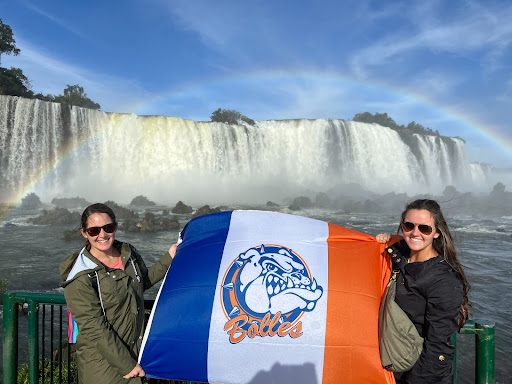We’re delighted to interview first grade teachers Brittany Hetland and Sara Heninger of The Bolles School in Ponte Vedra Beach, Florida. In this spotlight, they share how all of their young readers are progressing in both fluency and comprehension with Being a Reader.
Tell us a little about yourself, your school, and the students that you serve.
We teach first grade at The Bolles School in Ponte Vedra Beach, Florida. Our school is a PreK–12 private school that serves on four campuses in the Jacksonville area.

This is our second year teaching together and it feels like we have been teaching together forever! Our teamwork and ability to collaborate together so perfectly makes going to work so much fun. This summer we took a trip together to Argentina to study the culture there and how we can implement this in the classroom. We also enjoy coaching cheerleading together at our school! We feel beyond blessed to have such a strong partnership and school to serve in.
What is the most rewarding part of being an educator for you?
Brittany: Seeing my students succeed many years after I have taught them and knowing that I had a part in their success is incredibly rewarding.
Sara: For me, the most rewarding part of being an educator is creating a class family of lifelong learners. I love watching and growing with each student every year.
How long have you been implementing Being a Reader? Tell us a little about your implementation.
Here at The Bolles School, we began implementing Being a Reader last year (2021–2022). At the beginning of our implementation, we were anxious. This was a new grade level for both of us and a new school for Sara. However, once we began diving in and seeing the progress of our students, it was love at first small-group lesson!
Our small-group time is sacred and we appreciate how each lesson is perfectly planned and moves fluently to the next lesson. We also appreciate the reflection and questioning that Being a Reader implements.
What do you appreciate about Being a Reader?
Our small-group time is sacred and we appreciate how each lesson is perfectly planned and moves fluently to the next lesson. We also appreciate the reflection and questioning that Being a Reader implements.
What have you noticed about your students’ learning and engagement?
We have never had students beg for small-group time like we did this past year. When you have a buy-in from both students and teachers, something magical is created. Our students, no matter what level they fell in, progressed so beautifully with both fluency and comprehension. When we polled our students at the end of the year, small-group time was their favorite part of the day by far!
Our students, no matter what level they fell in, progressed so beautifully with both fluency and comprehension.
How has Being a Reader affected or changed your own teaching and learning?
Being a Reader allows us to spend quality, differentiated teaching time with all 20 students daily. This is something that we struggled with in the past. This program reaches all kids at various levels, all while fostering a love of learning and helping students grow into empathetic and compassionate people. Being a Reader makes teaching reading so much more than just reading and we love it!
What advice or insights would you share with an educator who is new to Being a Reader?
Our biggest advice is to observe Being a Reader in action. We had the opportunity to visit a school that has been using Collaborative Classroom curricula for many years. Their advice and the little tips they used were invaluable as we began our implementation. We learned very quickly that perfection will not be achieved in the beginning and you will continue to learn and grow as an educator with each lesson you teach. Give yourself grace and trust the process!
***
Read another independent school spotlight: Leaders and teachers at Brookstone School in Georgia discuss the power of their Collaborative Literacy implementation.
